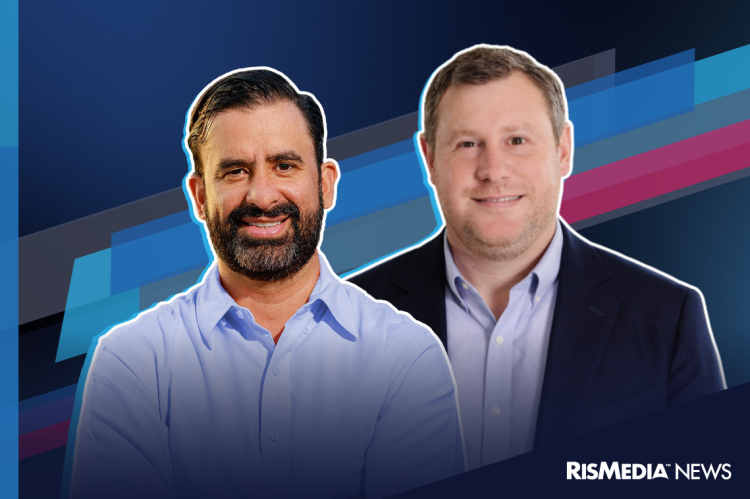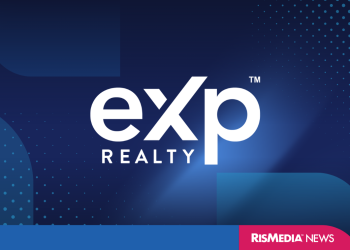Above: Leo Pareja and Todd Denman
Teams have a lot of reasons to change their affiliation. They also have a lot of reasons not to. As 2025 increasingly becomes the year of consolidation, big companies are scrambling to recruit high-producing teams amid a general shuffle of power and priorities across the real estate landscape—moves that appear both driven by, and driving, philosophical differences among competitors.
Todd Denman—leading a billion-dollar team based in Massachusetts—recently made a major change, switching his group from Compass to eXp. Both companies have taken strong stances (largely on opposite sides) of industry practices. Both have sought to grow rapidly despite a slower market, with eXp in particular focusing on teams.
This week, Denman and eXp CEO Leo Pareja sat down with RISMedia to discuss the decision to switch, as well as what affects these choices and the broader needs, incentives and strategies driving top-producing teams in the current market.
Editor’s note: this interview has been edited for length and clarity.
RISMedia: Todd, what were your short-term and long-term reasons for making a switch, and which was more important—were you more looking at what eXp could offer today, or what they could offer over 5-plus years?
Todd Denman, Founder, The Denman Group: What I would say is, I’ve been taught at an early age to look long-term, so most of my decisions are based on goal-planning. How am I providing as a leader being out front for my agents to help them? My mission is to enrich lives through real estate. So that’s helping clients, that’s helping my agents build careers, wealth, time, freedom. The pain of the market contraction in 2023, I felt it, and I leaned into that opportunity. In easy times, it’s easy to sell real estate, and harder times, it requires us to sharpen our saw, look at our expenses, look at where we’re investing money. And that line item, that brokerage line item, just stood out to me as the biggest controllable.
So once our team got to a certain size, the brokerage could no longer support us proportionally, but there was no real break in the financial model of the traditional brokerage. And that squeezed us a bit. And so when I started looking into the cloud-based brokerage at eXp, I realized—wow, the economic model just from savings in the short term is going to help us reinvest in marketing, salaried support staff, events for our clients, you name it. And in terms of long-term, the revenue share—I have a vision of having a larger coaching presence in the Northeast. So hosting attraction events where we bring people from all different brokerages in, we pour into the agents and how to grow their businesses, and I see that as a flywheel.
RISMedia: Leo, how does the short- versus long-term value proposition look from your perspective?
Leo Pareja, CEO of eXp Realty: I figured out when I got here that we can’t be all things to all people. So I boiled down what we are—the operating system that supports entrepreneurs on building the dream they want built.
That’s a super intentional sentence that I’ve come up with because I love agents that want to sell 10 full homes a year, and have a very balanced solo practice. And when Todd tells me he wants to become the biggest in New England, I’m here for it. If you want to sell 2,000 homes a year, we have that blueprint. If you want to sell 12 homes a year—our number one agent in Minnesota sold 242 homes by herself, right? Roughly $68 million. But bigger is not better. Better is better. And only Todd can determine what better looks like. And so if somebody says, “I want Class A space in the trendiest neighborhood, and I want you to do my marketing on really heavy paper stock, and I want a receptionist to serve people and give them coffee,” that’s not us. No one’s come up with a perfect business model. I think we’ve figured out who we are, and we are an operating system—meaning that I’m not the app, Todd’s the app. I want Todd to be the brand, and I want our OS to power his dream and help support.
RISMedia: Compass has been in the news a lot. Todd, how much did Compass’s recent decisions figure into your decision to move?
TD: I would say that being a leader for a large team, I’ve got to be paying attention to what the company that I’m affiliated with is doing. The reason that Robert Reffkin and Compass in the news is affecting everyone in the industry, whether it’s Clear Cooperation, what’s happening with Zillow, the NAR settlement.
My opinion on those things is that I care about each individual client and their needs. And I believe that on one hand—this is siding with Robert Reffkin a bit—I believe that clients should have a decision as to what they do with their property and how they market it. That being said, I think it’s much more important that agents are able to collaborate on listings and have access to each other’s listings. I do not see specifically in this current market, or almost any market, it being beneficial to consumers to have some larger majority of listings be private exclusive. So we’ve obviously been at Compass for a long time. We’ve had access to the private exclusive program. We’ve sold very, very few houses on it because we don’t feel like it’s the platform to get the client to their goals.
I’m a big believer in betting on myself, and as Compass grew and grew, I found the model there was just less control. I felt I had less control over my destiny as this company grew, and I made this decision before the acquisition (of Anywhere). Certainly after the acquisition, I feel like there’s a lot more ambiguity in terms of who Compass is going to be, what’s going to stay the same, what’s going to change, and circling back, I just wanted to bet on myself.
RISMedia: Leo, how are you reaching out to teams to present this “operating system” model? If everyone’s needs are so different, is it difficult to identify specific problems you can solve?
LP: So understanding who we serve I think is a cornerstone of that, which is highly entrepreneurial real estate folks. We have a program called Fast Cap. Other companies have similar intense onboarding programs. It’s a six-week program, it’s every day. It’s high accountability. At other companies that’s hundreds of dollars if not close to thousands of dollars. Ours is included. And the reason I can do that is because we are the brokerage. So I think most of the legacy models create friction between the agents and the brokerage, where I’m fully incentivized and aligned to get an agent to two or three more transactions on Todd’s team because I actually participate as the broker in the commission split.
RISMedia: What do you offer for teams who don’t want or need that kind of onboarding and training? Do you spend time tweaking your model for a specific team’s needs?
LP: Well, yes, the answer is yes. Because there’s so many ways to engage with us, right? There’s the corporate apparatus where we put on free classes, and that includes your designated broker, your state brokers.
You can show up to trainings that are put on by corporate five days a week and like eight, 10 different times a day versus if you pick an upline that you have a strong relationship with, whether it’s geographically based right down the street and you can go hang in at their office where it’s across the country and it’s more of a philosophy of how they do business.
A lot of folks get a lot of value from picking who they partner with based on the unique value proposition. We’ve identified our most successful attractors in the avatar that they’ve been successful—some social media based, some production based, some event based. But I think our superpower is—we’re not all things to all people. We don’t have a solution for everybody, and we don’t have to. This is who we are and this is our tribe, and if this vibes with you, please join us. And if it doesn’t, that’s awesome. We’re still going to be competitors and cooperating in this local real estate business that we participate in, even if we’re wearing different jerseys.
RISMedia: Todd, both Robert and Leo have been outspoken on industry issues. How does that affect your business, and how do their values align, or not align, with your values?
TD: Compass is a brand, a consumer-facing brand where consumers are following it. It’s in the news. People know who Robert Reffkin is. And I think that either works in the agent’s favor or it doesn’t. I know that when Robert announced his battle with Zillow, I had a couple listing appointments that were not great. They were like, if you get our listings banned, we’re going to terminate the agreement right away. That was not great.
I did feel aligned with Robert in terms of his values. I believe he was sincere in his mission against Zillow. eXp is an agent-facing brand. It’s not a consumer-facing brand. And what that affords me is the ability to create my own messaging that impacts my audience.
That being said, it’s also important that I’m in alignment with the leadership. And Leo is a huge reason why I moved to eXp. We were looking at other brokerages and watching their leadership come and go, and having Leo at the helm was really, really important to me. And we’re not a Zillow team, so we don’t invest any money in Zillow. So personally, it largely doesn’t impact the team, but I’m in consideration of the greater good for agents. It’s my opinion that I’d rather not promote giving Zillow money, but I respect agents that do give them money because it is a way that they put food on the table. And look, we have many agents at Compass that were Zillow Flex teams. There are many agents at eXp that are Zillow Flex teams. Zillow isn’t going anywhere.
I’m not concerned with Leo taking strong stances. In fact, I want him to. I don’t want a leader to be neutral. And that’s quite frankly what I value in Robert Reffkin and in Leo Pareja.












